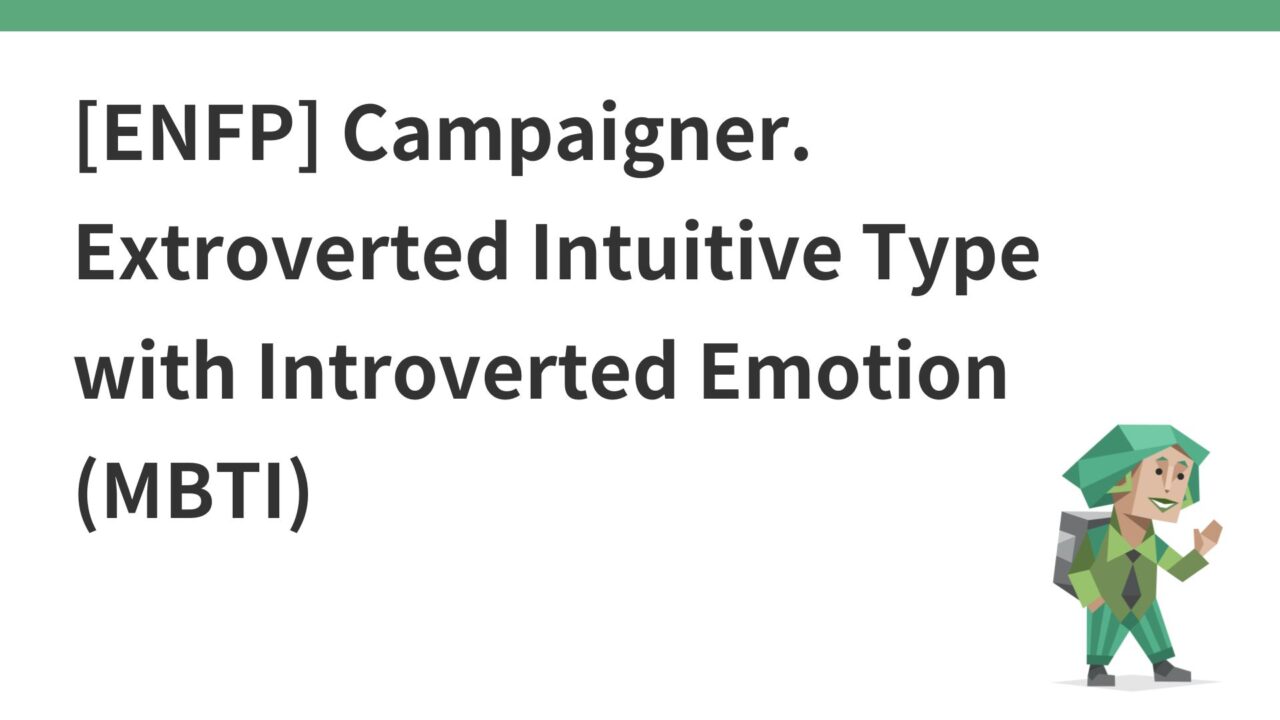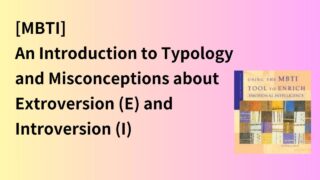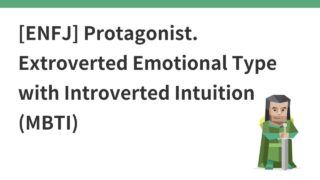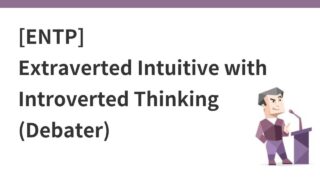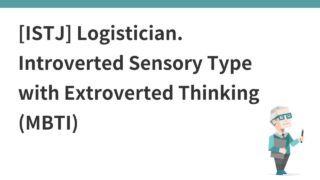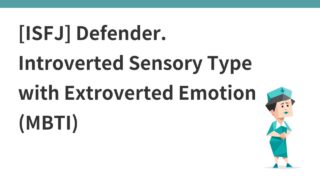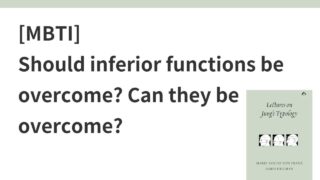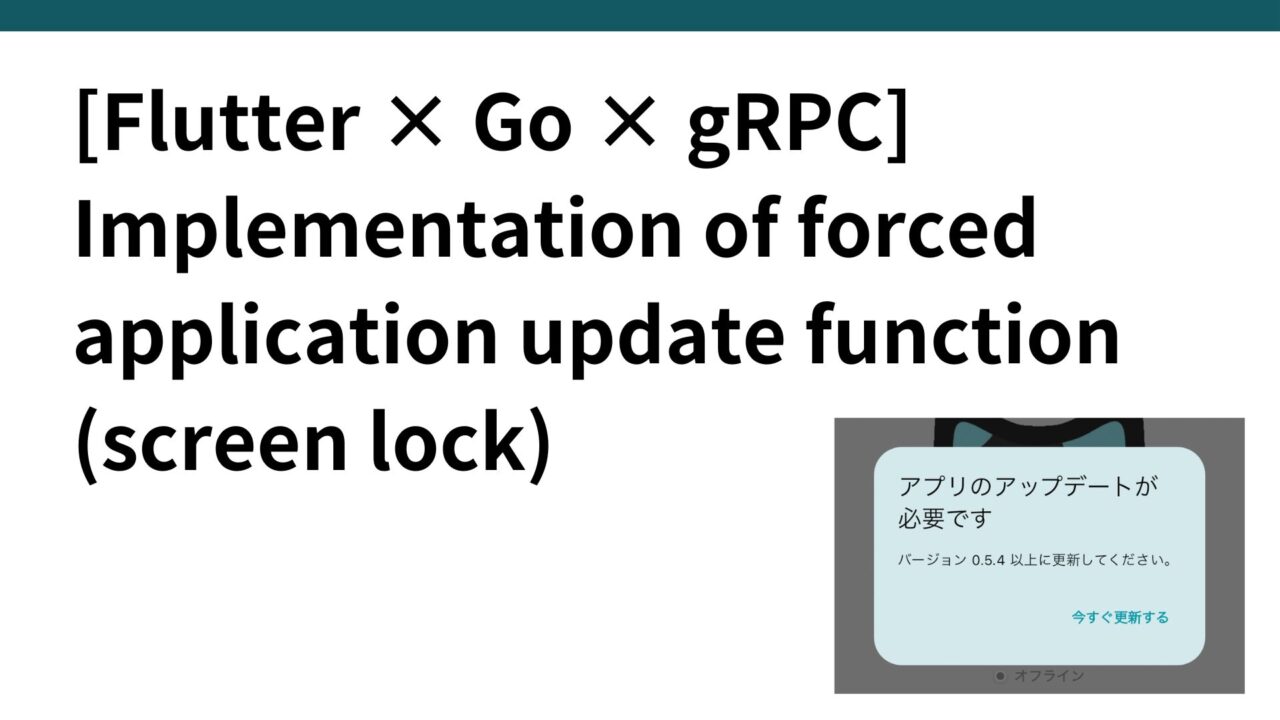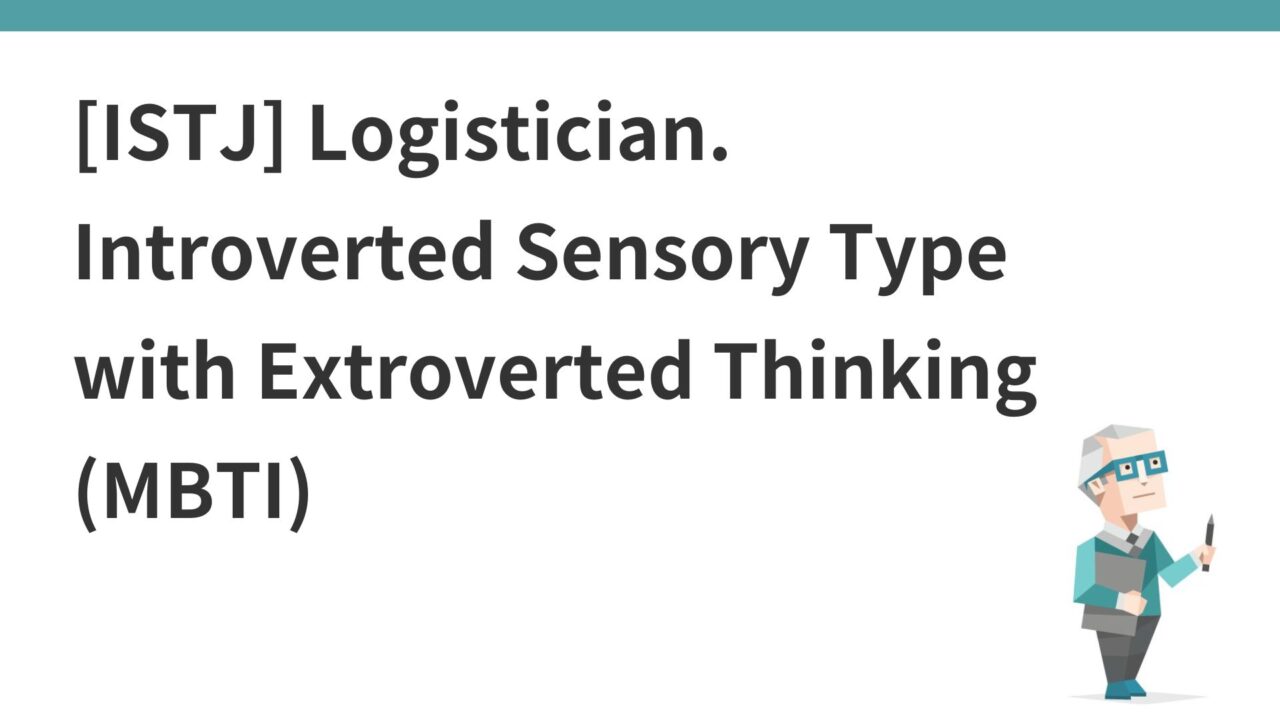- Introduction.
- Public’s impression of ENFP
- Ne-Fi: Extroverted intuition type with introverted emotions
- Characteristics and decision-making process for primary and auxiliary functions
- Difference between ENFP and ENFJ
- Difference between ENFP and ENTP
- Impression to the surroundings
- To strengthen the introverted sense of inferior function (Si)
- Communication Features
- Reactions during stress and points for improvement
Introduction.
I will summarize the following perspectives on each MBTI personality type.
- Public Impressions
- Characteristics of the primary and auxiliary functions and the decision-making process
- Impression to the surroundings
- Inferior Functions and How to Enhance Inferior Functions
- Communication Features
- Reactions during stress and points for improvement
In this issue, we discuss the ENFP.
Public’s impression of ENFP
If you Google ENFP, you will find related searches such as “ENFP crazy,” “ENFP good face,” “ENFP people-pleaser,” and “ENFP not suited for love.
It’s called “activist,” and celebrities/characters include Will Smith, Robin Williams Spiderman, etc. I think the name used to be something like public relations campaigner, but now it’s only campaigner.
Ne-Fi: Extroverted intuition type with introverted emotions
Cognitive functions of ENFPs are in order of development as follows
- Primary function (the function you are most aware of): extroverted intuition (Ne)
- Auxiliary functions (functions that are well-functioning but difficult to recognize in oneself): introverted affect (Fi)
- Third function: extroverted thinking (Te)
- Inferior function: introverted sensation (Si)
The following is a brief description of how each cognitive function affects an individual’s perception and behavior
| cognitive function | Inward (i) | Outgoing (e) |
| Intuition (N) | Pattern recognition – inner insights and future predictions | Explore new possibilities – ideas and abstract concepts |
| Thinking (T) | Logical analysis – building internal theories and organizing thoughts | Objective judgment – decision making for efficiency and fairness |
| Emotion (F) | Deep empathy – a deep understanding of personal feelings and values | Social harmony – forming emotional connections with others |
| Sensation (S) | Details of reality – reflection of inner concrete memories and experiences | Actual experience – direct interaction and action with the outside world |
Ne-Fi: looking for new possibilities and ideas and judging them by your feelings and values.
Characteristics and decision-making process for primary and auxiliary functions
Extroverted intuition (Ne): search for new possibilities
Extroverted intuition (Ne) refers to the ability to continue to explore new ideas and possibilities. When exploring new ideas and possibilities, we actively engage with the outside world. Specifically, we often interact with people of different backgrounds and values, read books, watch movies, and travel. Through such engagement with the outside world, we gain new inspiration. Finds intuitive connections between information and ideas from the outside world and tries to construct new concepts based on them.
Introverted feelings (Fi): focus on one’s values
Fi is a function that emphasizes internal values and beliefs; ENFPs are true to their own ethics and feelings and are not influenced by the expectations of others.
The combination of Ne-Fi allows ENFPs to receive external stimuli, but evaluate and act on them in light of their internal values.
Difference between ENFP and ENFJ
Both ENFPs and ENFJs are extroverted and emotionally focused personality types, but differ in their combination of cognitive functions and behavioral priorities.
ENFPs are primarily extroverted intuitive (Ne) and act based on their inner values (Fi) while exploring new possibilities and ideas. ENFJs, on the other hand, are more concerned with how others perceive them.
There is also a difference between P and J. ENFPs are rather bored and lose motivation when they see the results, whereas ENFJs make a plan and do it right to the end.
ENFJs tend to be frustrated when they do not see a vision to achieve (Ni), but ENFPs tend to take action to try first and explore their interests one after another.
Difference between ENFP and ENTP
Both ENFP and ENTP have extroverted intuition (Ne) as their primary function, but differences in the auxiliary functions of emotion (F) and thought (T) lead to some differences in behavioral and cognitive priorities.
ENFPs act on their values and emotions through introverted affect (Fi) and value deep emotional connections with others. On the other hand, ENTPs emphasize logical analysis and efficient solutions through introverted thinking (Ti) and tend to seek intellectual stimulation. This leads to the difference between ENFPs, who emphasize empathy and emotional support, and ENTPs, who emphasize logical argumentation and efficiency.
ENFPs tend to make statements based on their feelings, such as “I am enthusiastic about this project” or “This idea is very important to me,” whereas ENTPs tend to develop logical arguments and statements about efficiency, such as “From an efficiency standpoint, this is the best approach,” or “Your perspective is interesting, but from another perspective…” They tend to develop logical arguments and statements about efficiency, such as “This is the best way to do it from an efficiency point of view.
Impression to the surroundings
- Energetic and Passionate: ENFPs are seen as energetic and passionate people. They always have new ideas and are proactive, bringing positive energy to those around them.
- Highly empathetic: ENFPs are highly empathetic and good at understanding and supporting the feelings and needs of others. Friends and colleagues trust them as kind and understanding people.
- Flexible and Adaptable: They are seen by others as dependable because they are flexible to change and can adapt quickly to different situations.
- Sociable and approachable: ENFPs are sociable and approachable and quickly get along with many people. As a result, they are liked by others as friendly and easy to get along with.
- Bored and inconsistent: While they are easily interested in new things, they are also easily bored and have difficulty focusing on one thing for long periods of time, and may be seen by others as inconsistent.
ENFPs make a good impression on those around them as energetic, creative, empathetic, and sociable individuals, but they can be challenged by boredom, emotional volatility, poor planning, excessive idealism, and a tendency to avoid conflict.
I know several ENFPs, and of course, there are gradations in the degree of ENFP depending on the ratio of each function, but the typical ENFP is exactly the impression I listed above. It is no exaggeration to say that the word “easygoing” is exactly what ENFPs are all about. They are resourceful, flexible to new ideas, and sociable, but easily bored. Easily heated and easily cooled. He has a very good sense of interpersonal distance and balance, and no one seems to hate him.
However, if ENFP is not well balanced when spending time with others, one may force oneself to act diplomatically in order not to disrupt the atmosphere and appear unconcerned, but then feel psychological fatigue when one is alone afterward.
This is due to the fact that under stress, Fi may feel conflicted between their internal values and external expectations, and as a result, they force themselves to act diplomatically, even though this is not how they feel 、、、、 and later look back and get sick.
To strengthen the introverted sense of inferior function (Si)
ENFPs have relatively the least developed introverted sensation (Si), a recessive function.
The introverted sense is “a brain function that focuses on past experiences and concrete facts. It judges situations based on data and experiences accumulated over time and uses them as a basis for future decisions. People who have a strong function in this function tend to have a good memory and to act in a stable manner based on past experiences.
Building Routines
Begin by introducing simple routines into your daily life. For example, getting up at the same time every morning, exercising at the same time several times a week, and other small habits are effective.
Record of past experience
Consciously utilize your sense of introversion by keeping a journal or setting aside time to reflect on past events. This will help them understand how past learnings and experiences influence current decisions.
Attention to detail
Practice paying attention to detail through projects and tasks. For example, you might research specific data and facts in detail for a work project and then make a plan based on that information.
What we need to learn to respect different types
Incidentally, the types in which this sense of introversion (Si) is most developed are ISFJs and ISTJs; ISFJs and ISTJs often act with reliability and responsibility, respecting social norms and traditions.
For ENFPs, who tend to seek change and prioritize new experiences, the ISFJ’s and ISTJ’s respect for stability and continuity may be helpful and helpful in striking a balance.
We need to learn that a firm and impersonal business-like rule for making decisions is also a useful way to help others improve their situations.
Communication Features
Highly empathetic
- Expresses feelings openly, thus making the other person feel emotionally connected to him or her. Openly share emotions such as joy and sadness.
- Avoid confrontation as a way to promote harmony and coziness
Positive attitude
- He has an optimistic and positive attitude and often keeps conversations upbeat and positive. He excels at encouraging and energizing others.
Flexibility and open-mindedness
- Open to new ideas and the views of others, as long as one’s values are not insulted.
Extensive Interests
- Interested in diverse topics and enjoy conversing on a wide range of topics. Curious and enjoys learning new information.
boredom
- They have difficulty staying on the same topic for long periods of time and often move on to new topics one after another. Because of this, conversations can become scattered.
Reactions during stress and points for improvement
When exposed to stress, ENFPs may trigger a series of typical reactions, as their primary function, extroverted intuition (Ne), is over-expressed, or introverted sensation (Si), an inferior function that is usually under-used, surfaces.
Reactions under stress
- Excessive Idea Generation and Agitation: When Ne is overworked, ENFPs may generate new ideas one after another and feel agitated and restless. They pursue too many possibilities and become unsure in which direction to go. ‘I feel like I need to do this and that, but I don’t know where to start!’
- Surfacing introversion (Si) and obsession with the past: When Si is expressed in an unhealthy manner, the patient tends to obsess over past experiences and failures. The patient repeatedly thinks about past events and feels anxious and regretful. I can’t stop thinking about the mistakes I made in the past. If only I had done something differently back then…”
- Emotional Outbursts and Self-Reflection: Stress can cause emotional instability and sudden emotional outbursts. Subsequently, they reflect excessively on their behavior and their self-esteem declines. They may say, “I got upset, but that wasn’t good. Why couldn’t I have been more calm?”
- Lack of Concentration and Distractions: During times of stress, it is difficult to focus and concentrate on things. Tend to become distracted when working or tackling everyday tasks. ‘No matter what I do, I have trouble concentrating and get distracted easily.’
Key Points for Improvement
- Learning from the past: If Si’s influence tends to make us cling to the past, we should be conscious of learning from past experiences and applying them in a positive way. While looking back on the past, it is important to see it as a step toward the future.
- Realistic goal setting and planning: Setting small, specific goals and proceeding step-by-step can reduce excessive idea generation and frustration. Creating a task list and planning your actions is effective. Decide, “I’m only going to do this today, and then do it.”
